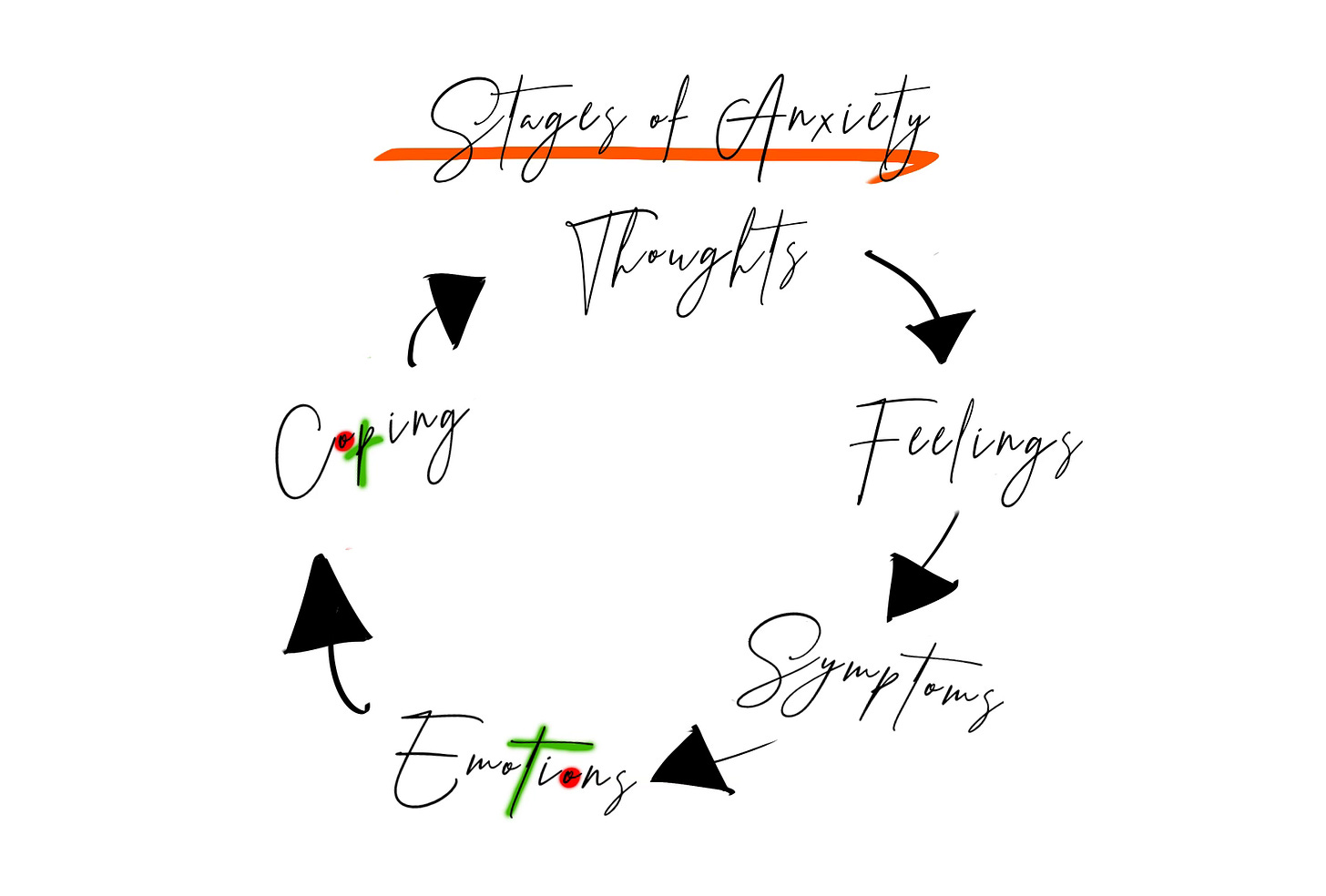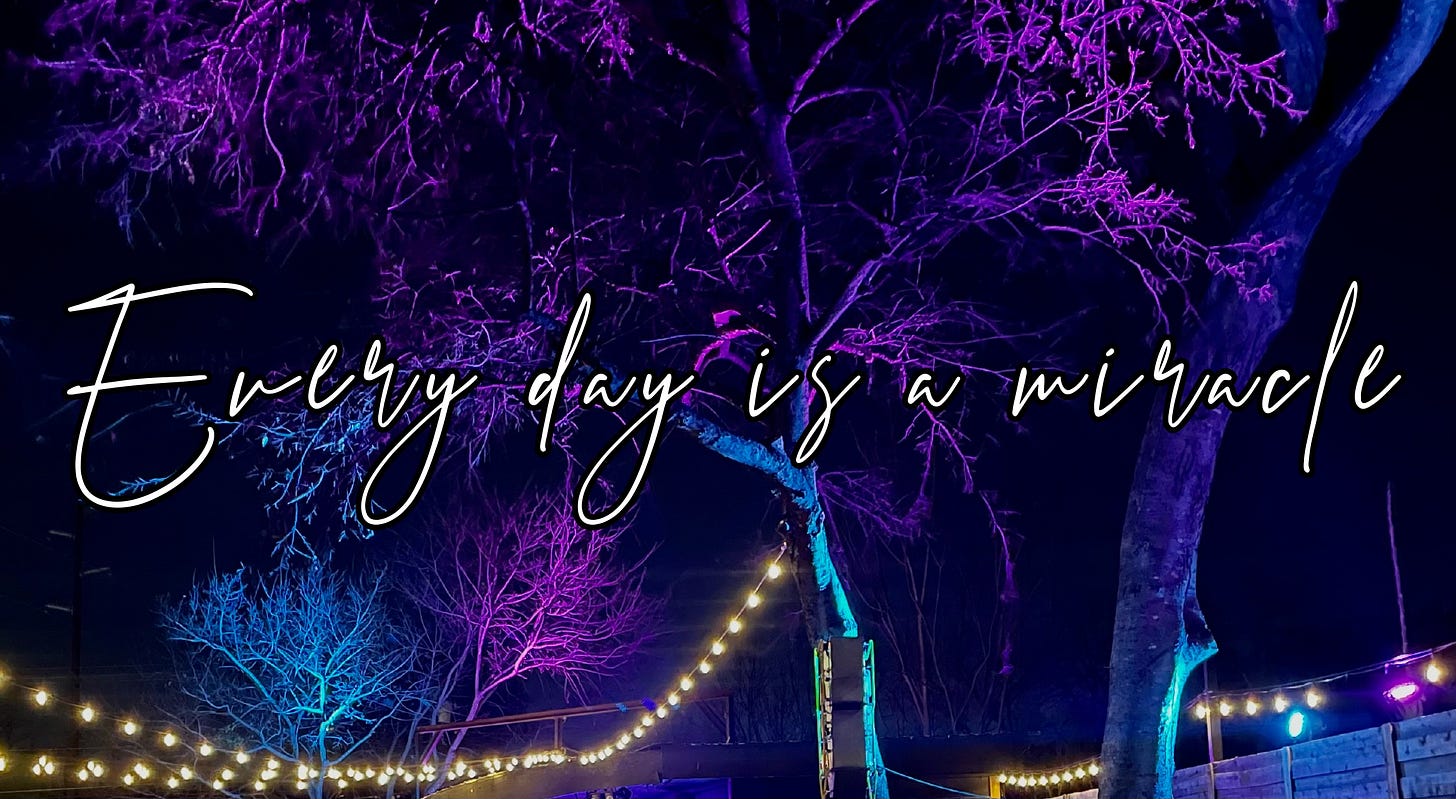Mental Health Discussion: "The Wedding Day"
A look into agoraphobia
While it is clear that the previous anecdote was full of anxiety, it may not be immediately clear to some that the discomfort stemmed from agoraphobia. Agoraphobia is a type of phobia that may not be immediately recognizable, even to someone suffering from it. It presents in individuals as fear of crowds, situations in which there may not be an immediate escape, and in a manner that naturally follows the five stages of anxiety cycle (see below for my lovely illustration). Those suffering from anxiety are especially susceptible to develop agoraphobia following an anxiety attack if one’s thoughts condition them to pair a place or situation to the fear response. While one may not necessarily be scared of the place itself, there may be a fear of what may happen when going or returning to a specific location under certain circumstances. It becomes a Catch-22 situation.

By comparison, the average adult may feel a little uneasy when they arrive at a concert set in a stadium if it is a new experience or after not attending one for a period of time. The feeling subsides shortly after the concert begins. For someone with agoraphobia, however, anxiety may start to build up days, weeks, or even months before the concert, depending on the severity of the phobia. For some, just the thought of the concert can generate fear and trigger the physical symptoms that come with anxiety. For others, it could make an appearance until the moment when they are walking into the stadium or venue. It is easy to think of crowded everyday settings, but we do not typically think of agoraphobia in weddings because they do not happen often and they are cause for celebration. Yes, there are certain aspects of wedding ceremonies that are nerve-racking and scary, but overall, they are generally viewed as beautiful occasions. For me, none of those typical “cold feet” thoughts were present.
Someone suffering from agoraphobia will begin creating accommodations in the name of safety such as avoiding shopping on certain timeframes or carrying a bottle of water wherever they go. Instead of shopping at the mall, they may shop at smaller outdoor marketplaces, such as outlets. While in general, many people do not enjoy shopping during busy hours, the anxious person will avoid these situations as a form of protecting themselves and preventing a hypothetical anxiety attack. Slowly, and the timeline for this process is different for everybody, these accommodations snowball to the point that there is no safe place left for the individual.
I remember thinking before, during, and after the wedding, “I am crazy or I am going crazy.” This was a common thought when I was going through episodes with Anxiety. I no longer feel that way, but it took much reflection and exploring through textbooks, websites, and peer reviewed articles on “abnormal psychology” to re-organize my beliefs. I began treating myself with exposure therapy and by practicing mindfulness, behavioral approaches that have long-standing research to prove their effectiveness and have allowed me to reprogram my thought patterns (and consequently, my behaviors).
In essence, exposure therapy helped me realize that I was attributing fear where there was none through controlled situations. If I was afraid of concerts, for example, I would go to a concert alone with the sole purpose of getting comfortable with the anxiety. While at the concert, if I noticed I was engaging in a cognitive distortion (e.g. catastrophizing, jumping to conclusions, overgeneralizing), I would process those thoughts. After years of re-wiring my thoughts and investing in myself, the fear became much more manageable. I was able to take myself from not being able to go to a store to attending a sold-out concert with a capacity of 50,000 people. Did I feel anxious? Yes. Did I do it anyway? Yes. Did I enjoy it? Not at first, but by the end, I loved it and felt so proud of myself. It did not happen overnight. There is definitely so much prep-work that goes into exposure therapy, and I would recommend anyone suffering from agoraphobia to find a therapist that specializes in anxiety, behavioral approaches, or that has experience with exposure therapy.

In those “in vivo” moments, those fears of impending doom or going insane are so draining and soul-crushing. It is imperative that we validate them and process them with a therapist. Doing so will help us realize that, as incapacitating as those feelings may be at that moment, we are not alone. So many people experience anxiety, and it will come and go as all other feelings do.
From my experience as a therapist, part of the reason people with anxiety feel they are “losing it” is that, while we all experience anxiety, we experience a unique version of anxiety, even if it can be categorized as something more specific like “arachnophobia” or “social anxiety.” Anxiety is deeply personal and complex. We can suffer from a negative experience, and we subconsciously attribute that experience to similar situations or as a result of a trigger. It is also possible for a culmination of unique stressors from our daily life to impact our overall ability to regulate our bodies and minds. Behaviorally speaking, we begin to reinforce these negative distortions until they solidify as our reality — a shadow attempting to suffocate us on a daily basis. But we are not crazy. We just need to dedicate some time to analyzing our perspective, behavior, general existence, and learn how to properly love and care for ourselves by creating a healthier lifestyle.
“… we begin to reinforce these negative distortions until they solidify as our reality — a shadow attempting to suffocate us on a daily basis.”
I opened comments for this post. I want to know what you think about this publication and whether you are learning anything useful for you. Feel free to drop a thought or question!


This publication affected me in a profound way. I've been teaching the concept of anxiety and its treatment for over 20 years. Your personal experience and eloquent description allowed me to experience anxiety from a very different perspective: a deeply personal and unique perspective. You reminded me that anxiety can’t be reduced to a textbook or DSM definition - it’s different for each of us, making it a very isolating and sometimes shameful experience.
Your search for relief is testament to your courage and strength. What an amazing feeling it must be to conquer such a formidable adversary. I felt the anxiety as you experienced it and I also felt your triumph and freedom.
I hope that you will continue to use your gift for writing to teach us more.